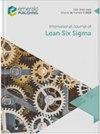Lean manufacturing practices and industry 4.0 technologies in food manufacturing companies: the Greek case
IF 3.7
2区 工程技术
Q2 ENGINEERING, INDUSTRIAL
引用次数: 0
Abstract
Purpose Food manufacturing companies which are essential for national economies, need to attach importance to the adoption of both the lean manufacturing (LM) operational excellence methodology and the Industry I4.0 (I4.0) technologies that empower LM to achieve operational improvement. This study aims to focus on the Greek food manufacturing companies and determine the degree of implementation of LM practices and I4.0 technologies and the impact of I4.0 on LM. Design/methodology/approach A survey was conducted based on a structured questionnaire which included items reflecting LM practices and I4.0 technologies. A sample of Greek food manufacturing companies were approached and 102 of them fully completed the questionnaire. Descriptive statistics were applied to determine the degree of implementation of LM practices and I4.0 technologies, while the impact of I4.0 on LM was determined through the linear regression analysis. Findings The degree of implementation of LM practices in the responding food manufacturing companies is high, while the degree of implementation of I4.0 technologies is low to medium. The findings also support a significant and positive impact of I4.0 on LM. Research limitations/implications The small size of the sample of the responding Greek food manufacturing companies, the subjective character of the data collected and the cross-sectional nature of the study, constitute the main limitations of the study. Based on these limitations, further studies can be designed. Practical implications The present study findings can guide the managers of the food manufacturing companies to further increase the degree of implementation of LM practices through adopting I4.0 technologies. Therefore, they can improve quality, eliminate waste, survive and be more competitive in the current difficult business environment. Academics can also benefit from the present study, given that it provides the LM practices and I4.0 technologies that can be further tested and validated in the food sector. Originality/value To the best of the authors’ knowledge, this is the first study that focuses on LM and I4.0 in the Greek food manufacturing companies operating in a business environment where the crises of finance, energy and the Covid-19 pandemic dominate.食品制造企业的精益生产实践和工业 4.0 技术:希腊案例
目的:对国民经济至关重要的食品制造公司需要重视精益生产(LM)运营卓越方法和工业4.0 (I4.0)技术的采用,这些技术使精益生产能够实现运营改进。本研究旨在关注希腊食品制造公司,确定LM实践和I4.0技术的实施程度以及I4.0对LM的影响。设计/方法/方法根据结构化问卷进行调查,其中包括反映LM实践和工业4.0技术的项目。我们接触了一些希腊食品制造公司的样本,其中102家完全完成了问卷。采用描述性统计来确定LM实践和I4.0技术的实施程度,通过线性回归分析确定I4.0对LM的影响。调查结果:受访食品制造企业实施LM实践的程度较高,而实施工业4.0技术的程度为中低水平。研究结果也支持I4.0对LM的显著和积极影响。研究的局限性/启示回应希腊食品制造公司的样本规模小,收集的数据的主观特征和研究的横断面性质,构成了研究的主要局限性。基于这些局限性,可以设计进一步的研究。实践意义本研究结果可以指导食品制造企业管理者通过采用工业4.0技术进一步提高管理实践的实施程度。因此,他们可以提高质量,消除浪费,在当前困难的商业环境中生存和更具竞争力。学术界也可以从目前的研究中受益,因为它提供了LM实践和I4.0技术,可以在食品行业进一步测试和验证。原创性/价值据作者所知,这是第一项关注希腊食品制造公司在金融、能源危机和Covid-19大流行占主导地位的商业环境中的LM和I4.0的研究。
本文章由计算机程序翻译,如有差异,请以英文原文为准。
求助全文
约1分钟内获得全文
求助全文
来源期刊

International Journal of Lean Six Sigma
Engineering-Industrial and Manufacturing Engineering
CiteScore
8.90
自引率
15.00%
发文量
46
期刊介绍:
Launched in 2010, International Journal of Lean Six Sigma publishes original, empirical and review papers, case studies and theoretical frameworks or models related to Lean and Six Sigma methodologies. High quality submissions are sought from academics, researchers, practitioners and leading management consultants from around the world. Research, case studies and examples can be cited from manufacturing, service and public sectors. This includes manufacturing, health, financial services, local government, education, professional services, IT Services, transport, etc.
 求助内容:
求助内容: 应助结果提醒方式:
应助结果提醒方式:


